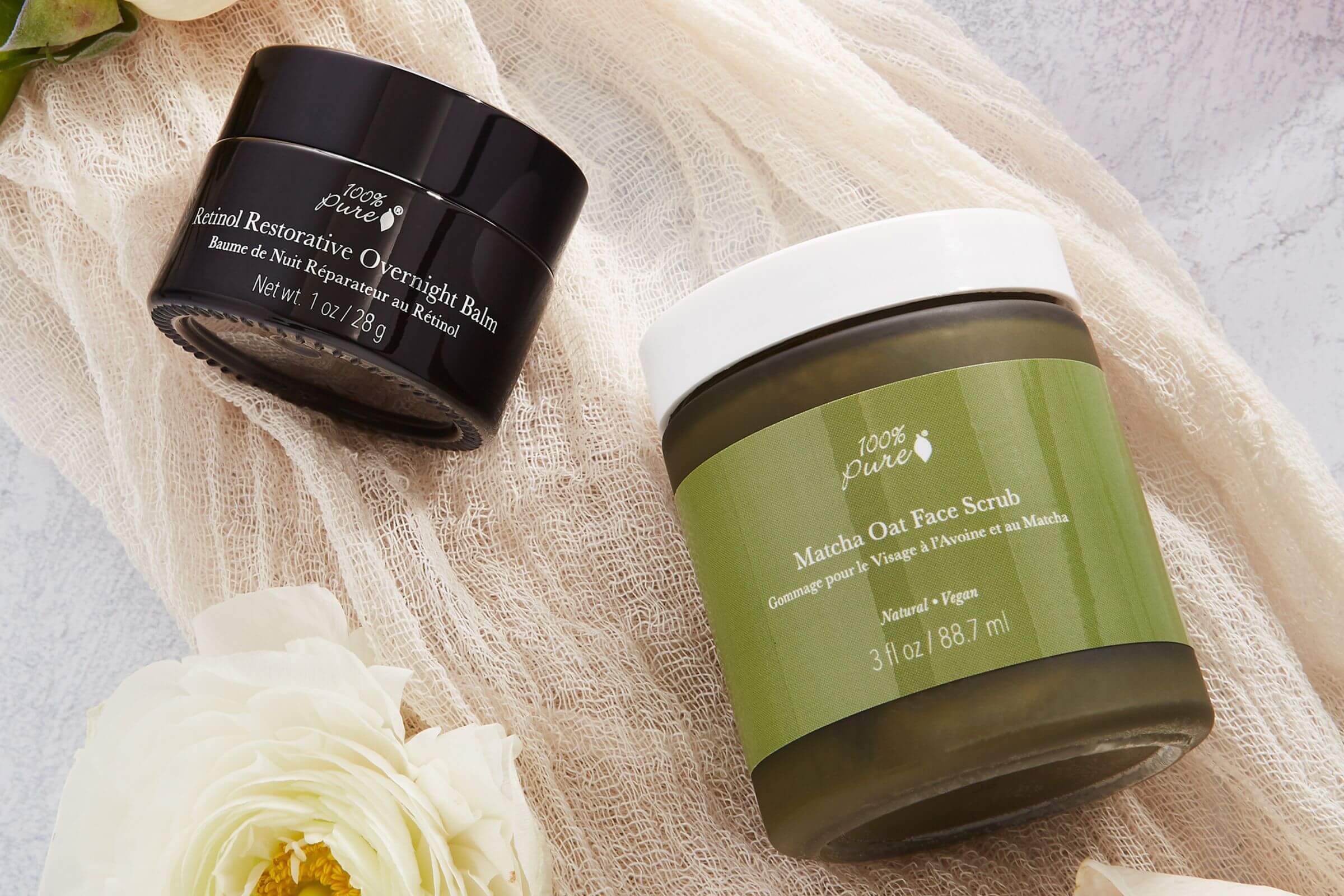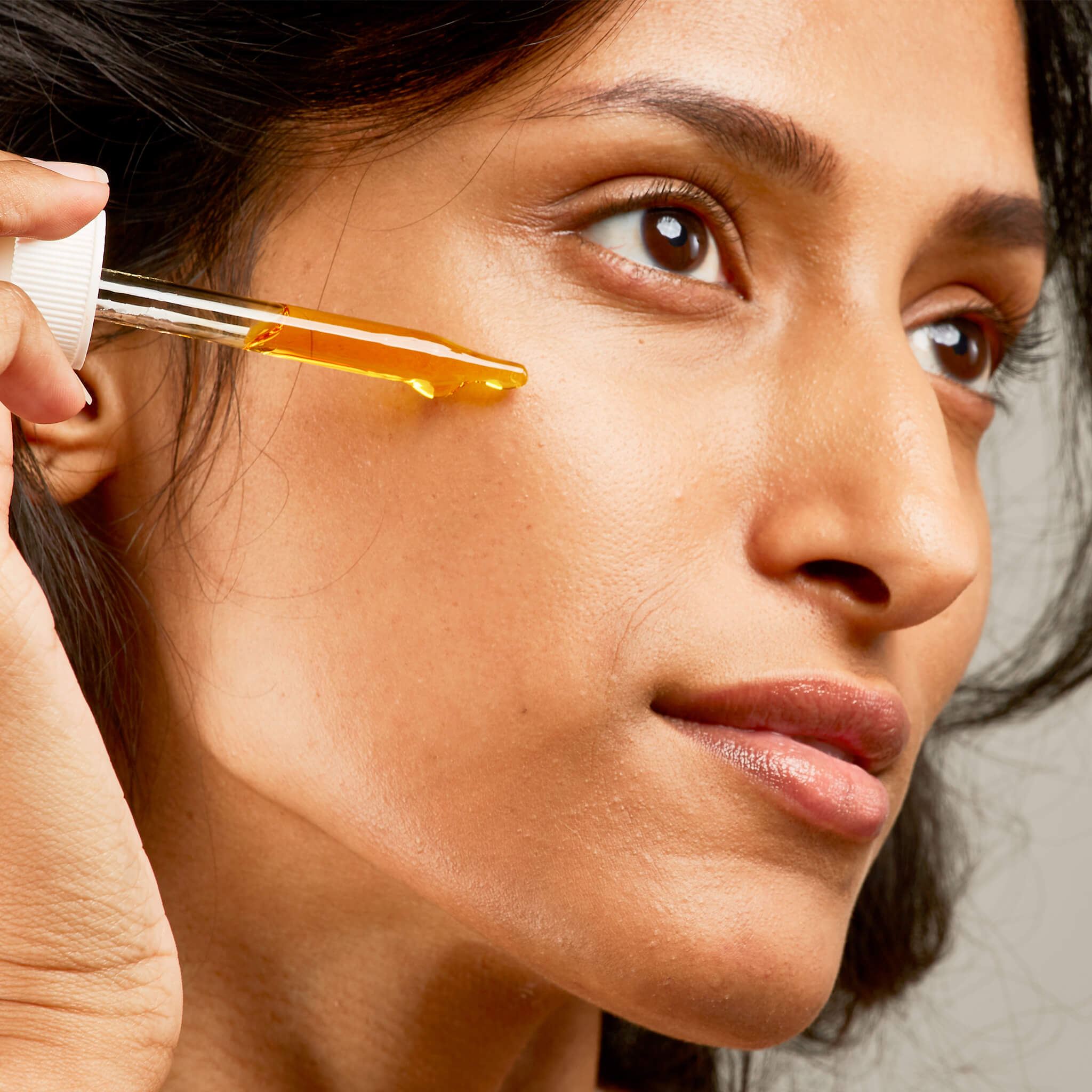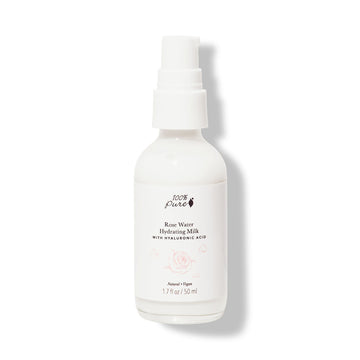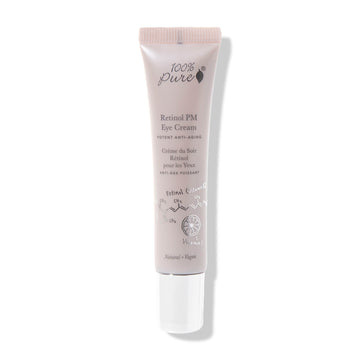
As more individuals gain a more health-conscious approach to what they consume, it’s becoming more common (and even customary) to wonder about the ingredients in our makeup and skincare.
And as natural skincare has grown increasingly in demand, many consumers have raised concerns about its parallel: synthetic skincare.
While natural skincare can be a beneficial choice, it’s sparked a bit of a debate in the community: what’s better, natural skincare or synthetic skincare?
Right off the bat, this answer has a bit of nuance, and requires a little deep-diving.
So join us on our journey to demystify natural and synthetic skincare–starting out with some basic definitions.

So what, exactly, is “natural skincare?”
Before we begin, it’s important to note that the term “natural” is not regulated by the FDA, which means that there is no standard definition or criteria for natural skincare.
In other words, “natural skincare” can mean whatever a brand wants it to mean, and as such will align it with their own marketing strategy.
But in this context, we can define “natural skincare” as products that use ingredients derived straight from nature, such as seed oils, fruit extracts, and grains like oats and rice. Generally, natural skincare does not contain any synthetically created ingredients.
So what, then, is “synthetic skincare?”
Synthetic skincare, or “artificial skincare” is, in essence, skincare that’s made with synthetic ingredients which have been made in a lab–often from natural ingredients.
With the skyrocketing popularity of natural skincare, synthetic skincare has developed a bit of a bad rap. And while it’s true that synthetic skincare can include a few undesirables like parabens, silicones, and phthalates, it also includes some ingredients that we know and love, like hyaluronic acid and retinol.
Many beauty brands will even look to synthetic versions of certain ingredients for their formulations, since they’re often identical to natural versions on a molecular level while holding more consistency and a longer shelf life.
Newsletter Subscribe
for more blog updates and exclusive discounts
With the growing popularity of natural skincare, there’s been some discourse in the beauty industry declaring that synthetic skincare should be avoided altogether.
However, it’s actually not that simple. There are downsides to both synthetic and natural skincare, but there are benefits to both, as well.
With natural skincare, for instance, many ingredients can offer the skin some immense benefits.
And as you’ll quickly find, there’s a wealth of natural ingredients that have been backed by scientific evidence, like green tea, colloidal oatmeal, and rosehip oil.
However, just because an ingredient comes from nature doesn’t make it inherently safe, or even effective.
In fact, there are plenty of “natural” ingredients that you wouldn’t want in your skincare–cyanide, for instance, is one of the most deadly chemicals out there, and you can find small traces of it in peach pits and apple cores!
Plus, “natural” minerals are often known for having contaminants; talc, for instance, comes from deep within the earth, and must be treated for formaldehyde in order to ensure its safety.
And in that vein, natural skincare is almost always processed in a lab at some point, which further blurs the definition of “natural,” but can create some wonderful products. Hyaluronic acid, for instance, is often extracted from sweet potatoes in a lab, while salicylic acid, one of the best ingredients for acne, is lab-extracted from willow bark.
While it’s true that synthetic skincare can include harmful ingredients, there are some ingredients that we, as a cruelty-free community, love.
For instance, Glycereth-26 is a water-binding emollient and thickener, and it helps products feel smooth and luxurious, and there are no documented side effects. Another example is Hydrogenated polydecene, which has been known in clinical studies to help improve the spreadability and even application of skincare products, while smoothing out the skin.
Does this mean that synthetic skincare is better than natural skincare?
Not necessarily.
Both natural skincare and synthetic skincare have their pros and cons, and as a consumer, it helps to understand how you can benefit from either one.

Pro: Better Consistency in Batches
While many natural ingredients can go straight from the source and into the product, synthetic ingredients are manufactured by experts in a professional lab, which offers far more consistency and uniformity in batch quality.
Con: Some synthetics may clog pores
Though typically safe and effective, there are some ingredients in synthetic skincare that may cause irritation or clog pores. That’s why we tend to steer away from PEGs, silicones, and synthetic dyes.
Pro: Creates Kinder Alternatives
Lab-extracted ingredients in synthetic skincare can allow us to choose more sustainable, cruelty-free options. Squalene, for example, is a hydrating ingredient that’s traditionally harvested from shark livers–a great example of not-so-great natural skincare.
Squalane, however, is extracted in a lab from rice bran, sugarcane, and olives.
Pro: Natural, glow-boosting benefits
Plant-based ingredients are known for their high levels of antioxidants, which help fight the damaging free radicals our skin encounters on the day-to-day. Antioxidants can include polyphenols in green tea, beta-carotene in carrots and sweet potatoes, and vitamin C in citrus and rosehips.
Con: Natural ingredients aren’t always responsibly sourced
An important caveat with natural skincare is that “natural” doesn’t always mean “ethical” or “sustainable.” There are some natural ingredients that are sourced through unsustainable practices–for example, panax ginseng is known for its healthful benefits, but it’s heavily endangered due to exhaustive harvesting. Then, there are “natural” ingredients that involve the exploitation, harming, and even killing of animals. Squalene, for instance, comes from shark liver, while snail mucin is harvested off snails through practices that cause them immense stress.
Pro: Often in alignment with a vegan/cruelty-free lifestyle
While natural skincare isn’t always used through sustainable practices, it’s important to note that some of the most sustainable skincare products use natural ingredients and follow a nature-oriented approach.
At 100% PURE we’re dedicated to earth-derived ingredients with science-based results.
At 100% PURE, we’re committed to producing the purest, healthiest products on the market, while educating everyone on the importance of being kind to themselves, their neighbors, and the planet.
The Standards We Set:
-
All 100% PURE™ formulas follow strict purity standards with sensitive skin types in mind, and will never contain sulfates, parabens, silicones, or phthalates.
-
We source our pigments from fruit, vegetables, tea, and cocoa instead of synthetic FD&C colorants and heavy metal dyes
-
Our commitment to protecting animals, and as a cruelty-free brand, we will never, EVER test on animals. Learn more about our sustainability efforts here.
- Tags: September-2022, Skin Care
We carefully hand-select products based on strict purity standards, and only recommend products we feel meet this criteria. 100% PURE™ may earn a small commission for products purchased through affiliate links.
The information in this article is for educational use, and not intended to substitute professional medical advice, diagnosis, or treatment and should not be used as such.



